Following the devil’s tracks: Pity the Serbs? But they were the culprits
Part 3 – June 1994: In the final part of a Balkans trilogy visiting places he once knew but were all but destroyed, Robert Fisk concludes his journey in Bosnia, ‘the most beautiful killing-ground in the world’

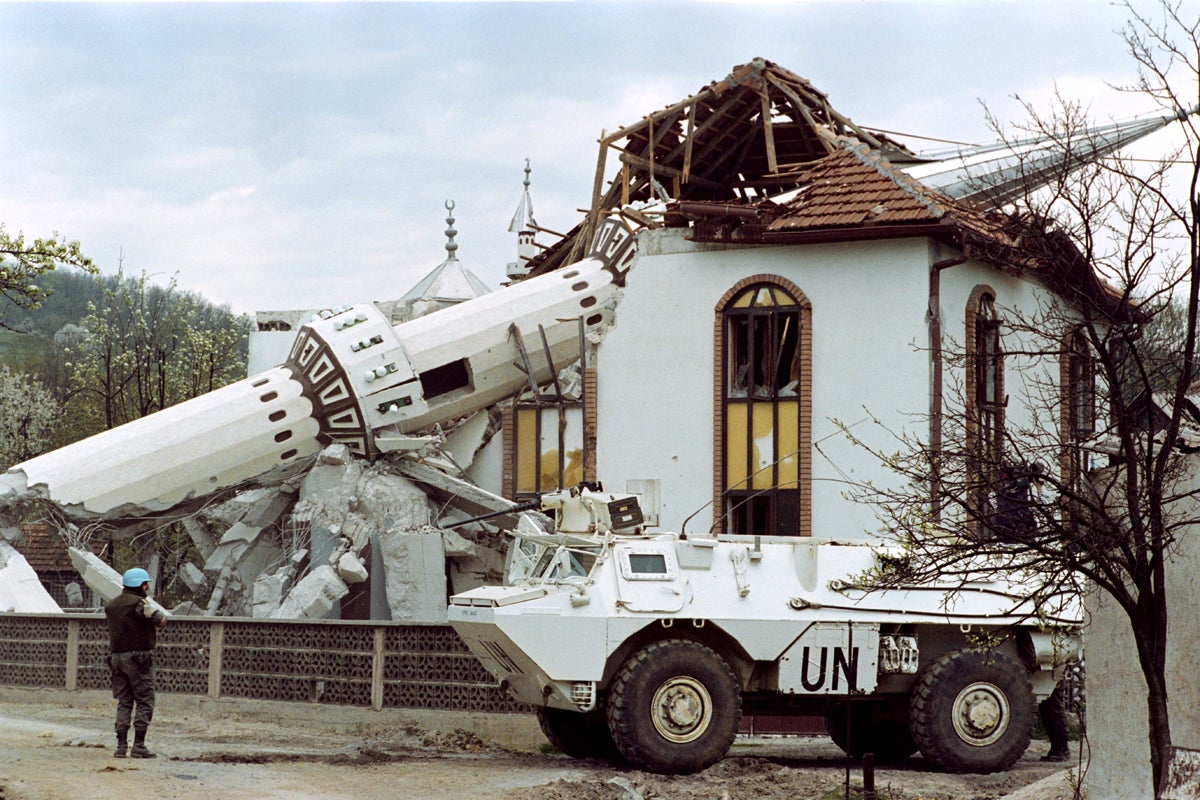
To visit Kresho’s enemies is no easy task. Even to drive into Serb-occupied Croatia, into the Krajina mountains, you need a car with Slovenian registration. Croatian cars, bearing the old Pavelic chequered flag of the new Croatian state on their plates, make the Serbs – that phrase again – “very angry”. In the Slovenian capital of Ljubljana, I experienced another ex-Yugoslav phenomenon: the need to lie. I was confronted with a document from the hire-car company. It said: “I confirm that I am aware of the ban on the use of the rented vehicle in the crisis areas [sic], and I irrevocably undertake to abide by that ban.” I signed it with all the audacity of Slobodan Milosevic.
On a balmy Sunday morning, I drove the car south, along the motorway to the front line at Karlovac, with a hitch-hiking Croatian medical student in the back seat. Ivan was one of the wisest men I met in ex-Yugoslavia. His father was a Croat, his mother a Serb. He hated the war, did not intend to fight and still kept in touch with Serb friends. As the hot fields drifted past us, he told me why he “thought the war was so cruel. “It’s lack of education,” he said. “Yugoslavs were mostly peasants. And even though education was compulsory under Tito, the peasants didn’t understand why their children should be sent to school when they could be used as man-power in the fields. Anyway, it was a long way to walk to school. So many children never had an education, never learnt even to read. The villages are cut off from each other by all these mountains and valleys. So the land divided up a people without education.”
I dropped Ivan in Karlovac and drove through Krajina, taking the road into Serb-held Bosnia over wild mountains to the village of Grahovo where a young Serb woman hitched a ride and talked of her peasant life, of the war, of all the little things that we reporters miss or do not know or cannot prove. She talked of her own people, the Serbs, as humans rather than as monsters.
“I used to work in a shoe factory but it closed when the bigger factory at Travnik was closed down by the war,” she said. “Our life is very hard. There is no coffee. We fry oats and barley and grind it into a powder that we use as coffee. We boil ash to use instead of soap for washing powder ... They are sending our men to fight in Bihac now, young men from Grahovo. They spent two years on the front line at Livno and some refused to go to Bihac and they are in prison at Kamenica.
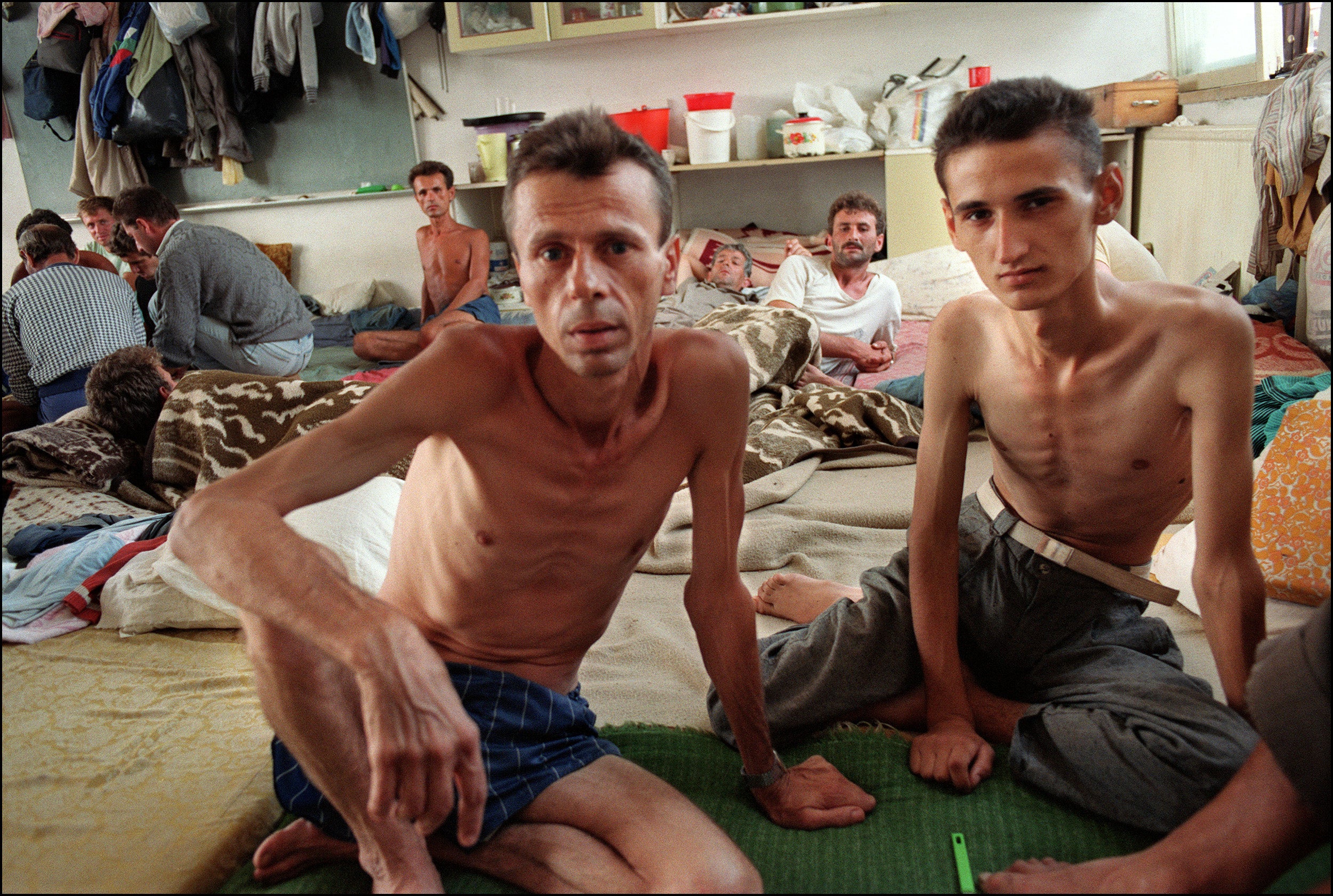
“Kamenica means a stony place,” the woman went on. “There is no food for the prisoners in the jail here so the families at home in Grahovo have to take food for them. Twelve young men from Grahovo have been killed at the front already and 180 from Drvar up the road have been killed at Bihac. Bihac never belonged to us. These men were not defending their homes. You cannot imagine how bad it is. They never leave the trenches because they get killed if they do. They go to the toilet in the trenches and eat and sleep there.”
We drove on towards Kluj, past the towering peaks and emerald green rivers that make Bosnia the most beautiful killing-ground in the world. “I have good friends in Grahovo who are Muslims,” the woman said. “Last year, they were baptised as Orthodox because they wanted to stay in our village. The mother is Serb, the father is Muslim. Now the sons are fighting on the front with our brothers. The father hasn’t been baptised yet. He drinks too much; and when he drinks, he starts swearing that his house is full of Chetniks. My brother had very good friends who were Croat. They had to move to Livno because they refused to convert from Catholicism. The war is the fault of our leaders. They go around like bears but none of them will die on the front at Bihac. I wish this war had never started. It may end officially, but the hatred is now so deep because everyone has lost close friends and relatives, and it will take a very long time to mend things.”
When we reached Banja Luka, the Serbs had even cleared away the rubble that was all that was left of the 16th-century Ferhad Pasha mosque
So the young woman from Grahovo spoke as we drove the carless roads across Bosnia, with her chatter of forcible conversions, until we dropped her beside a clump of beech trees. We were now deep in “ethnic cleansing” country, in that part of Bosnia whose Muslim population, in tens of thousands, was deported, massacred and gang-raped. The beauty of the countryside did not end. The lilacs and climbing red roses, the dark green orchards stretching far up into the hills, hid from us the mass graves that the Serbs dug for their neighbours two summers ago.
Soon the ruins began, the burned houses and villas and shops. Two years of undergrowth have given them a sinister quality, as if nature has tried to conceal the evil that was done here. Amid the desolation, we stopped at a cafe. On the porch were two Serbs who had drunk too much beer. They were looking at us in that quizzical, haughty way alcoholics adopt when they would prefer to be on their own. Even our Serb interpreter didn’t want to talk to them.
“If you ask such a question, they might... well, beat you,” she said. She knew the question had to be asked, if only because it was dishonourable to ignore the obvious; that there was a crumpled, dynamited house across the road, in what had been a partly Muslim town.
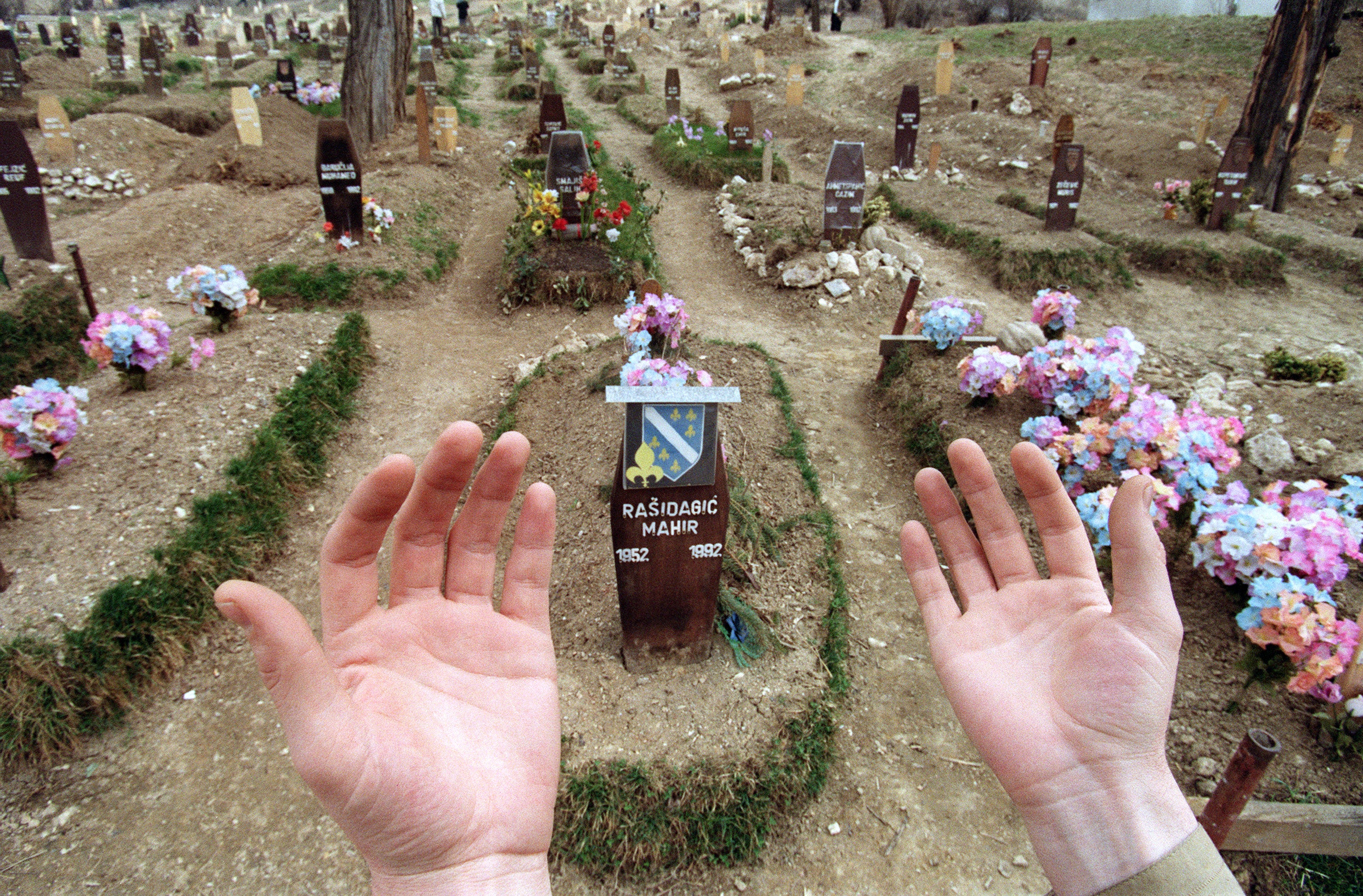
“So what happened to that house?” I asked, pointing with all the innocence of a English tourist across the highway. The two Serbs looked at each other and giggled slightly. All over Bosnia and Croatia I encountered this phenomenon: as soon as someone was about to say something terrible, or to lie, he or she would snigger, or, sometimes, become incomprehensible with laughter. But the younger Serb regained his composure and nodded to the splintered remains of walls and roof and windows in the sunlit meadow 30ft from us. “That house belonged to a Muslim shopkeeper,” he said. “He later became the manager of this restaurant. I don’t understand it. I worked for 20 years in the Sisak iron works. I was not dissatisfied although it was far from home. But that Muslim, he wasn’t satisfied. He was plotting, as documents found later showed. He was plotting to ‘ethnically cleanse’ the Serbs here.”
So I was sitting in the Muslim’s old cafe, sitting with Serbs who knew the man they “cleansed”. The man had even used the word. I asked what had happened to all those other houses up the road towards Prijedor, the ones with the crumpled roofs and fire-blackened windows with the four Serbian Cs in a cross and the words “Exchange Serb House” painted on the sides. The innocence of my question sounded as fraudulent as his reply. “The men who came here were very angry,” he said. “And some of the Muslims resisted.”
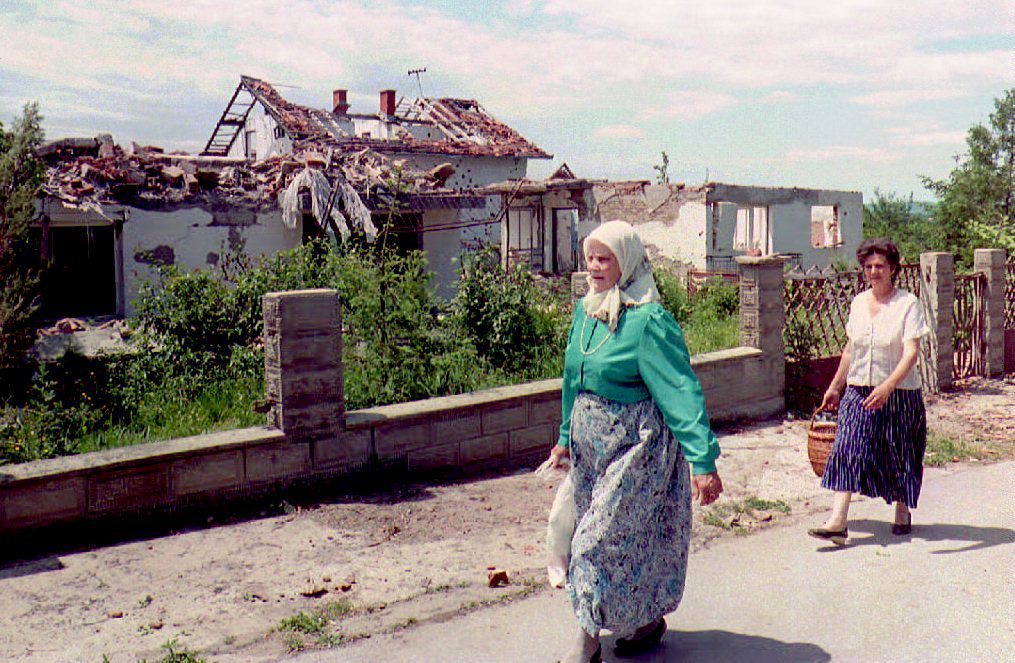
Shame upon them for resisting. Shame upon the innocent Muslims of Ostra Luka and Sanski Most and Prijedor and Kozarac and all the other villages and towns we drove through, mile after mile of ghost villages north of Kluj. You can see how the Serb lie is developing. The Muslims were aggressors. At one point we drove for 20 miles through unending ruins.
When we reached Banja Luka, the Serbs had even cleared away the rubble that was all that was left of the 16th-century Ferhad Pasha mosque. I had seen it in ruins last year, after the police had trucked two lorry loads of explosives into the grounds and blown the priceless treasure to pieces. We dined that night at the Adria restaurant just opposite the mosque – with its picture window through which diners could admire the mosque as they eat. Now there’s only a vacant lot and nobody wants to talk about the view. “Maybe the Muslims did it, maybe the Serbs,” a cyclist told me. The Muslims will no doubt be blamed for blowing up the other 15 mosques around Banja Luka. This is how the myth is being constructed. The Muslims destroyed their own heritage.
In the offices of the television station of the Bosnian “Serb Republic”, we asked Vojo Kupresanin, station director, about this. “The Serbs want this war to be finished,” he said. “They want their 500-year-old dream of their own national state to come true. This means we want a purely Serb national state. On the ruins of the former Yugoslavia, everyone but the Serbs got their state. Croats and Slovenes got their state. Macedonians got their state. Only the Serbs were deprived of their state.”
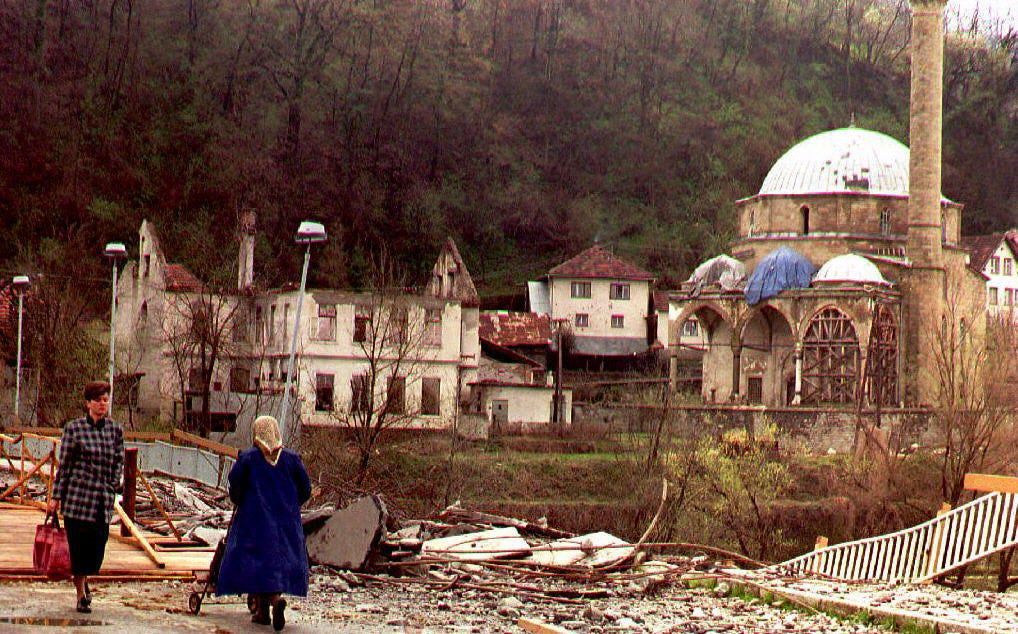
Kupresanin informed us that he was a monarchist. He wanted Prince Tomislav Karadjordjevic as his king. He wanted a future state that would be called the “Kingdom of Serb Krajinas” and had already received promises from seven European monarchies that such a land would be recognised. There seemed no end to his Ruritanian optimism.
We told him to take care. He said to us: ‘We have to go to the war when we’re asked to.’ He was shot in the right side of the head by a sniper the very day after we saw him
And what of the Muslims? “Those Muslims who live in Banja Luka and Bjelina have the same rights as the Serbs but they refuse to join the Serb army and we do not blame them for that. So those who do not join the Serb army have forced labour obligations. In the future, all our Muslims and Croats can live equally and safely among us.” So who destroyed the mosques? Kupresanin’s reply was truly Orwellian. Muslims were engaging “terrorists” to destroy their own mosques, he said, in order to provoke world public opinion against the Serbs. “Secondly, there are some misdeeds of some extreme Serbs. That’s it. A number of Serbs were caught and detained and legal procedures are in process against them. This does not mean that the top authorities were behind the destruction. There are some army officers who divert from their orders – mainly right-wing extremists. They might, for example, be officers whose families have been massacred in the war. They do not think in a political way. But in the Serb republic today, the lawful, legal state is coming into power and I’m quite certain that all the culprits will be punished in an appropriate way.”
Why, said Kupresanin, there is now capital punishment in Banja Luka. Ten men have been executed, most of them Serbs. It was, to put it mildly, an interesting admission; the first time a Serb had suggested that army officers might have led the cleansing.
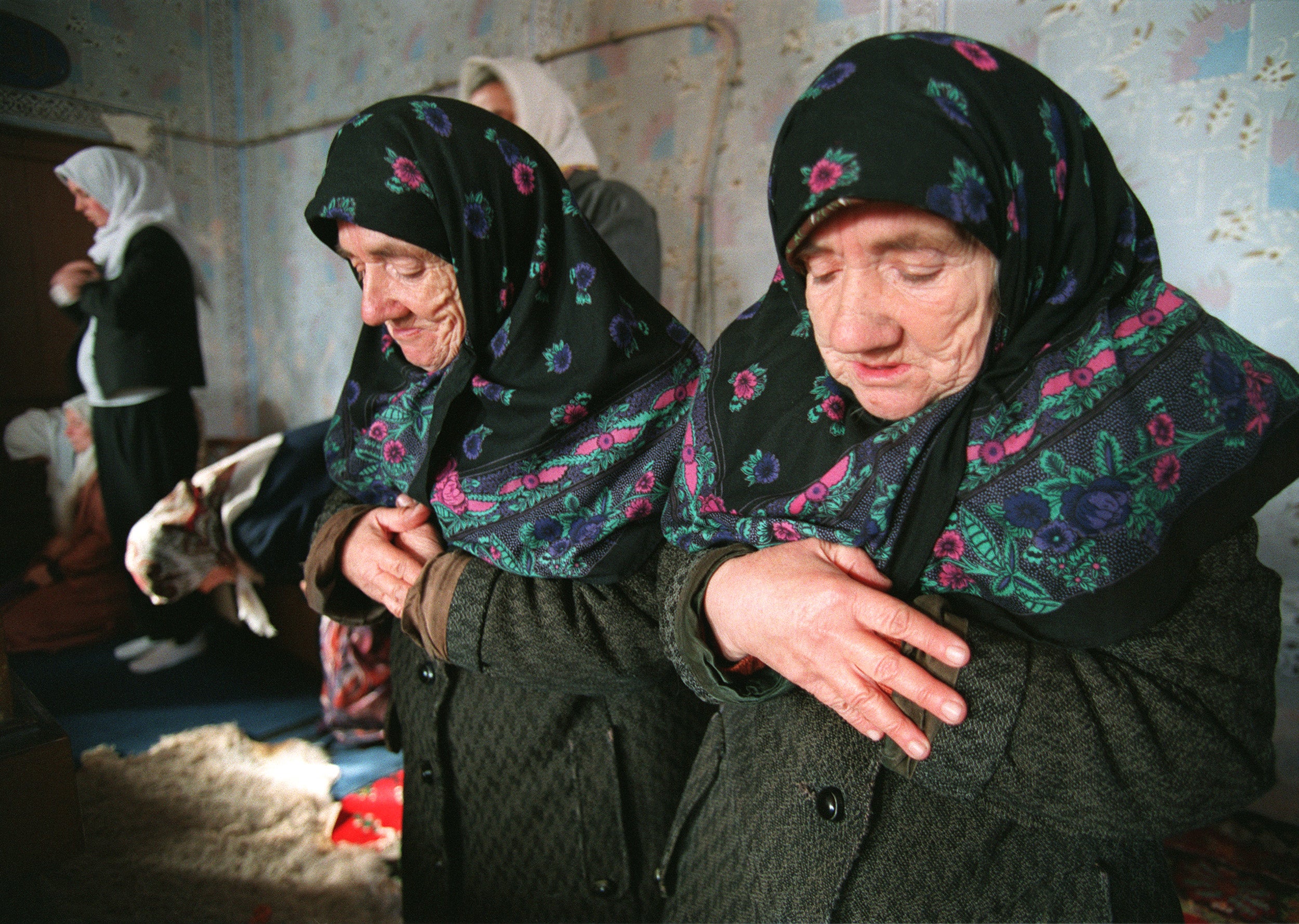
That same day, we visited the Muslims of Banja Luka, some of the 40,000 survivors of the 350,000 Muslims who lived around the city. They had been celebrating the feast of Bairam in four cellars, praying underground like Jews during the Holocaust. Fifteen thousand Muslims were now on forced labour, they said, some of them professors who were forced to work on the roads. One of the Muslims, a man I had met before, gave an unemotional account of life under the Serbs, sometimes reading from a secret diary of his people’s persecution.
“The Muslims and Croats on forced labour clean streets and cut wood for Serb soldiers and prune fruit trees, but the most difficult situation is where they work next to the front line,” he said. “Lately, more and more of our men have been sent to the battlefield to dig trenches on the front line. Some get killed. The Bosnian army probably know the Muslims are there and try not to shoot at them.
“But there is another kind of terror here in Banja Luka, a subtle kind of ethnic cleansing. Every day now, there are beatings, in the streets, in public places, in police stations. The police carry out waves of security checks. If a Muslim does not have his documents, he is beaten. It is a kind of treatment you go through before forced labour. In Banja Luka there is a hidden, marginalised community among the Serbs which I consider honest – but they are not strong enough yet to have any influence.
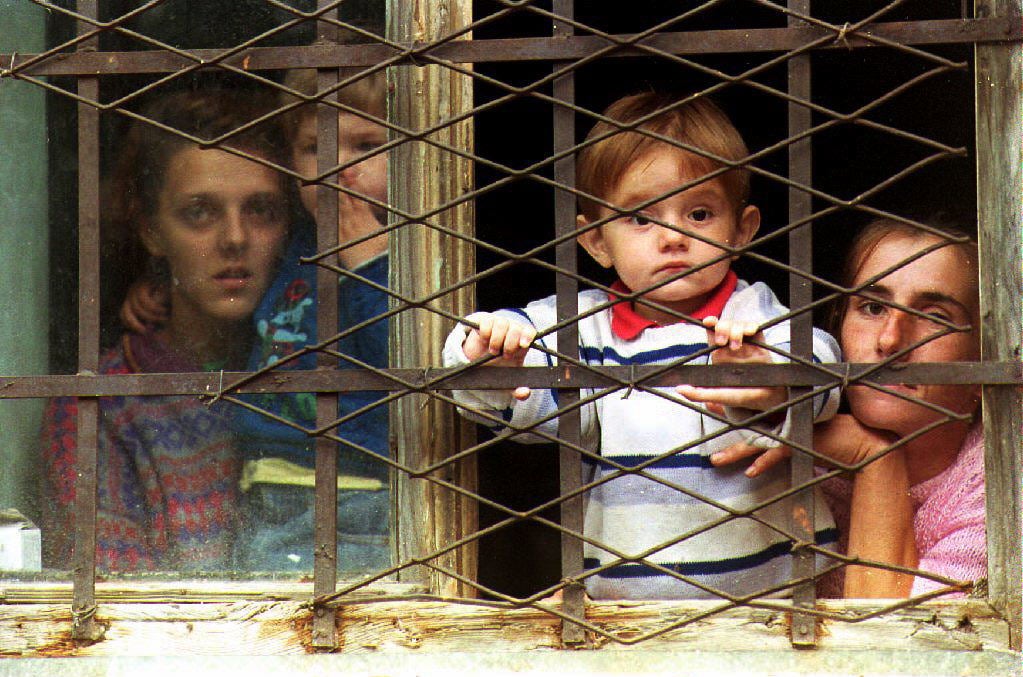
“Truly we need help. The Red Cross ask us if we want to leave – we tell them to stop trying to get us to leave – it is their job to force the Serbs to let us stay in our homes and treat us humanely. Forty-one Muslims were killed in Prijedor last month. Our latest murder victim here in Banja Luka was a woman of 85 called Nura Medanovic who was killed in her home. Help us. I do not know who started believing the idea that we want to create an Islamic state. Even we Muslims don’t want it. I don’t know whom we hurt so much that we have to be killed, our mosques destroyed, that we have to be displaced like Palestinians. We have to be – we shall be – the conscience of this world.”
A Muslim cleric had come to sit at our table and, as the other man spoke, tears began to run down the clergyman’s cheeks. “We bought four cows to sacrifice for the feast but the government has just confiscated them,” he said. “All our mosques have been destroyed. Now they are destroying our graveyards. They dug up the grave of Ferhad Pasha himself and threw his bones away.” And, sure enough, across town at the site of the Ferhad Pasha mosque, the bulldozers have destroyed all the graves.
It takes a few moments to understand what this means. They are murdering the dead as well as the living. An elderly Serb teacher wept as she looked at the desolation. “When I see this I think ‘Pity the Serbs, that they should have lent their name to this.’” Pity the Serbs we asked angrily? But they were the culprits, not the victims.
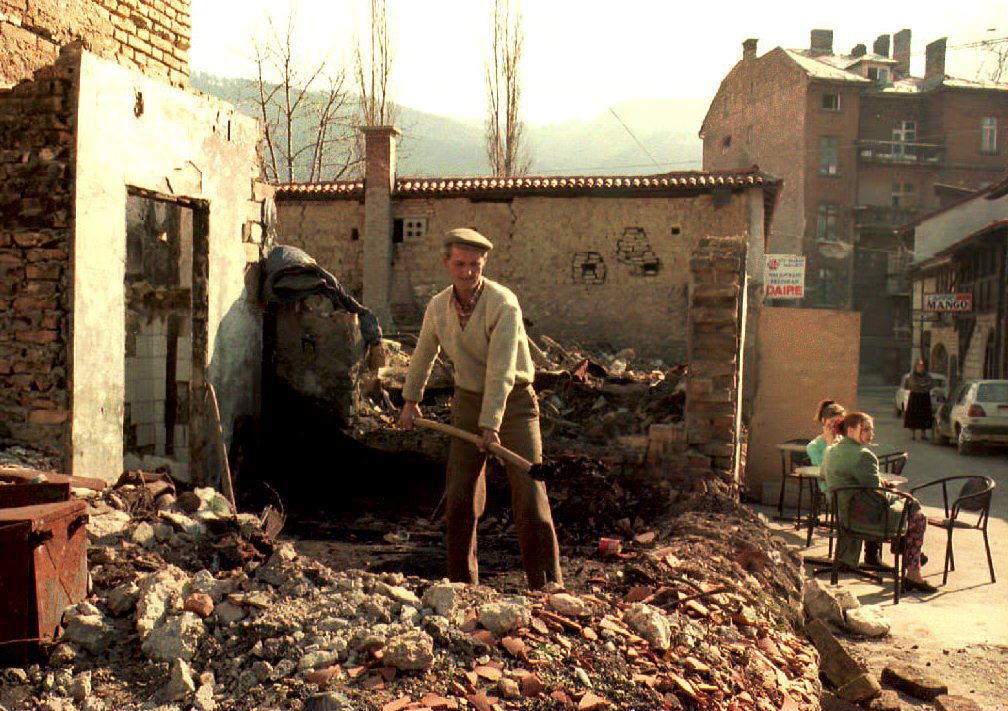
She and her fellow Serbs of Banja Luka, however, can enjoy a religious revival. As the last vestiges of Muslim culture are liquidated, a new Orthodox Cathedral of Christ the Saviour is being built in the city, replacing an identical church of the Holy Trinity which was bombed and then dynamited by the Germans and Ustashe in 1941 – with precisely the same deliberation as that with which the Serbs have just demolished the mosques.
It is not the only change in the city. Electronic goods are being exported to Greece. Street names are being Serbianised; so are the towns of Serbian Bosnia. Foca is now Serbinj, Donj Vakuf is now Serboran. But at a cost. Just as Mostar’s Muslim dead have filled the public park, so Banja Luka’s young Serbian soldiers are now buried in the local tennis courts, around 300 of them to date. The tombs are not mere earthen graves but huge marble affairs on which the dead man’s photograph is printed alongside his still-living parents, with space enough for mother and father and brothers to be buried in later years. In the Banja Luka cemetery, I found the grave of Bozidar Crnadak, a 19-year-old sniper in the Belgrade Guard’s Regiment. His mother Stanojka, like Amra in Mostar, was tending the flowers beside her dead son. His father Slavoljub sat on a nearby grave, unshaven, on the edge of tears.
“He was attending a school for hotel waiters when the war started,” the father said. “Then he was called up for the army. He had no leave but we went to see him in Vukovar in the last days of the battle there. It was a Saturday when we met him. We had a long conversation. We talked of this and that, as parents talk to a son. His aunt was with us and she said ‘We could get you out of this and you could come home if you want.’ But our boy said no, he was his company’s best sniper. Yes, we told him to take care. He said to us: ‘We have to go to the war when we’re asked to.’ He was shot in the right side of the head by a sniper the very day after we saw him.”
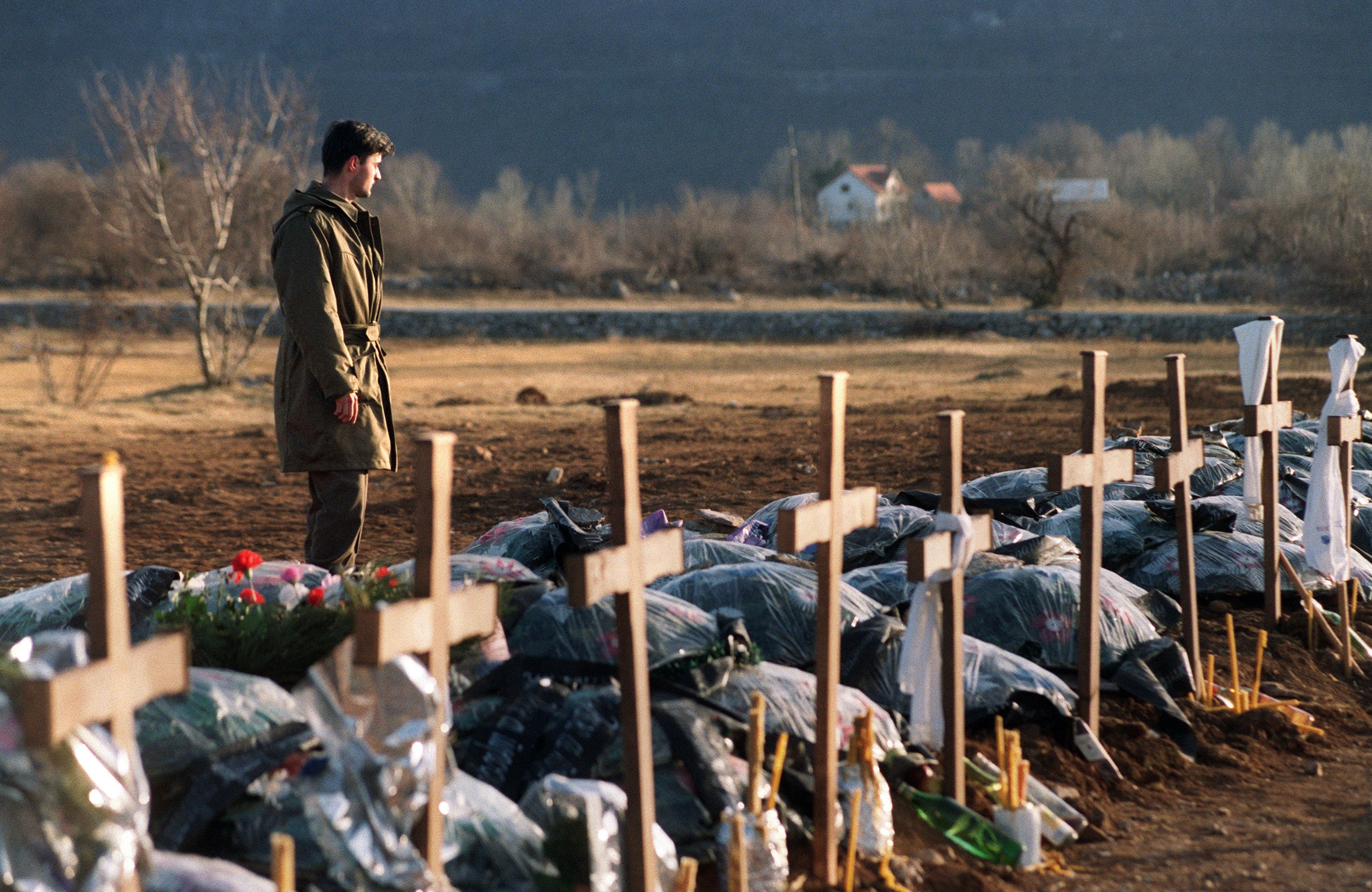
I did not mention Kresho, though I thought of him and the possibility that, only a few days earlier, I might have met the man who killed this young soldier. “We were at home when the news came,” the father continued. “There was a telegram brought to us by the postman. The worst thing is, he had been wounded at first and for nine days had been at the medical academy in Belgrade. But they never told us, so we never went to see him when he was still alive. We went to collect him. There was a military car which we followed back from Belgrade, and an officer and two soldiers, comrades of his, who fired shots over his grave.
“Our boy helped us in our little shop, along with his brother. We used to sell soap powder, but we didn’t feel like working after Bozidar died, so we did nothing. Now we are at the end of our savings. That’s our destiny.”
“Why was the war fought, I asked? “I don’t know,” the man replied. “More educated people can tell you that.”
Like Emir Listo’s, the Serb soldier’s grave had a poem attached to it, written by a childhood friend, Ranko Predarovic:
They shot this youth who was the bud of a flower. They shot our joy, our happiness. In the best years of your best youth, You fell bravely and that was the end of our love. And we shall remember you forever And you shall always be with us, our dearest Bobo. Your brave soldier’s death is only your physical going After which we are left with immense emptiness. But through our love, you shall be always with us, And there is no power – even powerful death – Which can separate you from your dear mother Stanojka, Your brother Dragan and your father Slavoljub.
Always. It is a curious word when no one can understand the future. For Bozidar Crnadak’s parents will have to go on living now in their little rump of Serbia. Ziba and her friends will never return to their home village of Gacko. The frightened Muslims of Banja Luka would not want to know their future. Stepinac will probably be canonised, but he is already dead. Will Melissa’s bridge ever be rebuilt?
We drove out of Bosnia that night, through those valleys scratched out by the devil’s fingernails, past bridges which angels had failed to protect, waved through the Serbian checkpoints for over 100 miles as Nato jets tracked their gold contrails over the mountains. Maybe they can rebuild the Stari Most. But how can you rebuild a country when its soul has been destroyed and its youth long buried?
Read Part 1 of Robert Fisk’s June 1994 report from Mostar here, and read part 2 here
Join our commenting forum
Join thought-provoking conversations, follow other Independent readers and see their replies
Comments

Bookmark popover
Removed from bookmarks